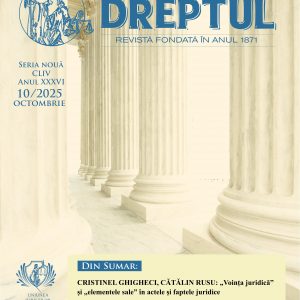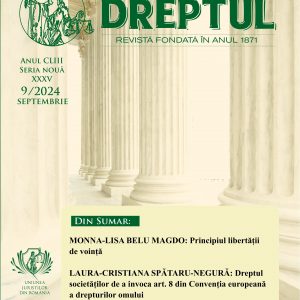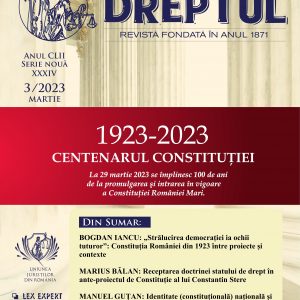-
 Un eveniment major al istoriei unui popor și aniversarea sa, precum Centenarul Marii Uniri (desăvârșirea procesului de constituire a statului național unitar), reprezintă pentru știința națională ocazia, după caz, deopotrivă de evocare și evaluare peste timp a semnificațiilor aferente din perspectivă proprie și, respectiv, de privire asupra sine însuși, surprinderea evoluțiilor și progreselor înregistrate în dezvoltarea proprie, a provocărilor prezentului și a posibilităților viitorului. Din acest punct de vedere știința dreptului are o implicare specială. Într-adevăr, prin natura și consecințele sale, ceea ce s-a întâmplat și realizat acum o sută de ani reprezintă, prin excelență, un proiect politico-juridic și poartă o puternică încărcătură prospectivă. Cercetarea dimensiunii juridice indispensabile și prioritare a procesului de constituire, desfășurare, desăvârșire și consolidare a statului unitar român, a permanențelor și manifestărilor și urmărilor sale de azi și de mâine a fost și rămâne o prioritate pentru știința juridică românească.
Un eveniment major al istoriei unui popor și aniversarea sa, precum Centenarul Marii Uniri (desăvârșirea procesului de constituire a statului național unitar), reprezintă pentru știința națională ocazia, după caz, deopotrivă de evocare și evaluare peste timp a semnificațiilor aferente din perspectivă proprie și, respectiv, de privire asupra sine însuși, surprinderea evoluțiilor și progreselor înregistrate în dezvoltarea proprie, a provocărilor prezentului și a posibilităților viitorului. Din acest punct de vedere știința dreptului are o implicare specială. Într-adevăr, prin natura și consecințele sale, ceea ce s-a întâmplat și realizat acum o sută de ani reprezintă, prin excelență, un proiect politico-juridic și poartă o puternică încărcătură prospectivă. Cercetarea dimensiunii juridice indispensabile și prioritare a procesului de constituire, desfășurare, desăvârșire și consolidare a statului unitar român, a permanențelor și manifestărilor și urmărilor sale de azi și de mâine a fost și rămâne o prioritate pentru știința juridică românească. -

-

-

-
 Unlike the old Civil Code, in the system of the new Civil Code (NCC) the assignment of claim enjoys a superior regulation, including as regards the problems of the publicity formalities stricto sensu. In this regard, the publicity formalities towards third parties, separate from those necessary for informing the assigned debtor, provide the possibility of taking knowledge about the assignment by any person concerned (successive assignees, mortgage creditors, pursuing creditors etc.). In principle, the assignment becomes opposable against third parties only from the moment of registration in the Electronic Archive for Security Interests in Movable Property [Article 1583 (2) of NCC]. This is the general rule of common law, from which the law also provides exceptions when considering the nature or the source of the assigned claim. The main exceptions refer to the assignments of real estate incomes and to the seizure of a real estate mortgage claim, which are noted in the land register [Article 902 (2) points 6 and 15 of NCC]. From the date of registration of the assignment in the public register, the assignee’s rights, that is the claim right and all its ancillary rights, including movable property and real estate mortgages, become opposable to third parties. The sanction of non-registration is the non-opposability of the assignment against the third parties concerned.
Unlike the old Civil Code, in the system of the new Civil Code (NCC) the assignment of claim enjoys a superior regulation, including as regards the problems of the publicity formalities stricto sensu. In this regard, the publicity formalities towards third parties, separate from those necessary for informing the assigned debtor, provide the possibility of taking knowledge about the assignment by any person concerned (successive assignees, mortgage creditors, pursuing creditors etc.). In principle, the assignment becomes opposable against third parties only from the moment of registration in the Electronic Archive for Security Interests in Movable Property [Article 1583 (2) of NCC]. This is the general rule of common law, from which the law also provides exceptions when considering the nature or the source of the assigned claim. The main exceptions refer to the assignments of real estate incomes and to the seizure of a real estate mortgage claim, which are noted in the land register [Article 902 (2) points 6 and 15 of NCC]. From the date of registration of the assignment in the public register, the assignee’s rights, that is the claim right and all its ancillary rights, including movable property and real estate mortgages, become opposable to third parties. The sanction of non-registration is the non-opposability of the assignment against the third parties concerned. -
 At the same time with the change of the jurisdiction of the courts vested with the solving of the applications for relocation in the new Civil Procedure Code1, the incidence of a particular situation was ignored: the subsistence of the reasons for relocation also at level of the courts of appeal competent to solve the relocation applications, when the relocation is requested from a court of first instance or a tribunal located in the same locality as the court of appeal, and the legitimate suspicion has sources well-anchored at local level. The High Court of Cassation and Justice was not late in „completing” this omission, by admitting an application for relocation of a relocation process, from the court of appeal in the locality where there were suspicions of lack of impartiality to another court of appeal, contributing, a fortiori, indirectly to the relocation of the substantive litigation to another court, away from the local sphere which did not provide sufficient guarantees of independence of justice.
At the same time with the change of the jurisdiction of the courts vested with the solving of the applications for relocation in the new Civil Procedure Code1, the incidence of a particular situation was ignored: the subsistence of the reasons for relocation also at level of the courts of appeal competent to solve the relocation applications, when the relocation is requested from a court of first instance or a tribunal located in the same locality as the court of appeal, and the legitimate suspicion has sources well-anchored at local level. The High Court of Cassation and Justice was not late in „completing” this omission, by admitting an application for relocation of a relocation process, from the court of appeal in the locality where there were suspicions of lack of impartiality to another court of appeal, contributing, a fortiori, indirectly to the relocation of the substantive litigation to another court, away from the local sphere which did not provide sufficient guarantees of independence of justice. -
 The concepts with which the theory of law operates are far from being the result of some philosophical speculations, without any connection with the concrete relations of the social life. Although eminently deductive, the science of law, as a whole, does not operate only deductively, without reference to facts, data of reality. In last analysis, the theoretical constructions formulated by the science of law (or legal sociology) are the result of a succession of inductive and deductive steps. A good knowledge, explanation and interpretation of law (of the legal phenomenon, more broadly) requires an appropriate methodology, based on which to achieve a scientific understanding of the mechanism of the social action of law, its functions, essence, content and form. In the conditions of the current scientific and technological evolution, there are happening profound transformations – of structure, of method, of vision – which determine that also the scientific research go through a fruitful mutation. From this methodological perspective, the author aims to address some essential aspects of the structure of law.
The concepts with which the theory of law operates are far from being the result of some philosophical speculations, without any connection with the concrete relations of the social life. Although eminently deductive, the science of law, as a whole, does not operate only deductively, without reference to facts, data of reality. In last analysis, the theoretical constructions formulated by the science of law (or legal sociology) are the result of a succession of inductive and deductive steps. A good knowledge, explanation and interpretation of law (of the legal phenomenon, more broadly) requires an appropriate methodology, based on which to achieve a scientific understanding of the mechanism of the social action of law, its functions, essence, content and form. In the conditions of the current scientific and technological evolution, there are happening profound transformations – of structure, of method, of vision – which determine that also the scientific research go through a fruitful mutation. From this methodological perspective, the author aims to address some essential aspects of the structure of law. -
 In this study, the author presents first the main reasons that led to the development of the 2009 Criminal Code and the objectives pursued by its wording. Subsequently, the author presents the main novelties brought by the regulations contained in the General Part and the Special Part of the new Criminal Code. Presentation of the characteristic features and innovations introduced by the 2009 Criminal Code compared to the Criminal Code of 1969 is achieved whilst revealing both the merits and some shortcomings of the new criminal law. These explanations are accompanied by numerous examples, own ideas and suggestions to improve the texts analyzed. In a final section, the author presents, in a reasoned manner, his own conclusions drawn in relation to the study of the new Criminal Code.
In this study, the author presents first the main reasons that led to the development of the 2009 Criminal Code and the objectives pursued by its wording. Subsequently, the author presents the main novelties brought by the regulations contained in the General Part and the Special Part of the new Criminal Code. Presentation of the characteristic features and innovations introduced by the 2009 Criminal Code compared to the Criminal Code of 1969 is achieved whilst revealing both the merits and some shortcomings of the new criminal law. These explanations are accompanied by numerous examples, own ideas and suggestions to improve the texts analyzed. In a final section, the author presents, in a reasoned manner, his own conclusions drawn in relation to the study of the new Criminal Code. -
 The central part of this study is dedicated to the comparative review of the provisions in Title I (“The Criminal Law and the limits of its scope”) of the Criminal Code in 2009 as compared with the provisions of Title I (“The Criminal Law and its scope limitations”) of the Criminal Code in 1969, the author highlighting both the merits and the shortfalls of the new Criminal Code, explanations accompanied by numerous examples, own ideas and suggestions to improve the texts under review. These explanations are accompanied by a thorough analysis of the provisions relating to the implementation in time of the criminal law, referred to in Title I of Law No. 187/2012 for implementing Law No. 289/2009 on the Criminal Code. In a final section, the author puts forth his own findings learned in connection with the matter investigated to which are added, in a synthetic form, the main proposals de lege ferenda aiming to improve the new criminal legislation.
The central part of this study is dedicated to the comparative review of the provisions in Title I (“The Criminal Law and the limits of its scope”) of the Criminal Code in 2009 as compared with the provisions of Title I (“The Criminal Law and its scope limitations”) of the Criminal Code in 1969, the author highlighting both the merits and the shortfalls of the new Criminal Code, explanations accompanied by numerous examples, own ideas and suggestions to improve the texts under review. These explanations are accompanied by a thorough analysis of the provisions relating to the implementation in time of the criminal law, referred to in Title I of Law No. 187/2012 for implementing Law No. 289/2009 on the Criminal Code. In a final section, the author puts forth his own findings learned in connection with the matter investigated to which are added, in a synthetic form, the main proposals de lege ferenda aiming to improve the new criminal legislation. -

-
 Presumption of innocence is one of the basic rules of criminal proceedings being expressly regulated in art. 52 of the Code of Criminal Procedure. First recognized as a fundamental human right [the Universal Declaration of Human Rights and the (European) Convention for the Protection of Human Rights and Fundamental Freedoms], the presumption of innocence is enshrined in the national legislation, first in the republished Romanian Constitution, having specific influence on the development of the entire Romanian criminal proceedings since 2003. In this study, the author sought to identify some of the situations that affect this fundamental principle of criminal proceedings, its analysis covering several procedural institutions. Equally, he outlined several proposals to ensure the compliance with the presumption of innocence both during the trial and in the stages prior to the prosecution, referring both to the current criminal procedural rules and to those provided for in the new Code of Criminal Procedure (Law No. 135/2010).
Presumption of innocence is one of the basic rules of criminal proceedings being expressly regulated in art. 52 of the Code of Criminal Procedure. First recognized as a fundamental human right [the Universal Declaration of Human Rights and the (European) Convention for the Protection of Human Rights and Fundamental Freedoms], the presumption of innocence is enshrined in the national legislation, first in the republished Romanian Constitution, having specific influence on the development of the entire Romanian criminal proceedings since 2003. In this study, the author sought to identify some of the situations that affect this fundamental principle of criminal proceedings, its analysis covering several procedural institutions. Equally, he outlined several proposals to ensure the compliance with the presumption of innocence both during the trial and in the stages prior to the prosecution, referring both to the current criminal procedural rules and to those provided for in the new Code of Criminal Procedure (Law No. 135/2010). -

